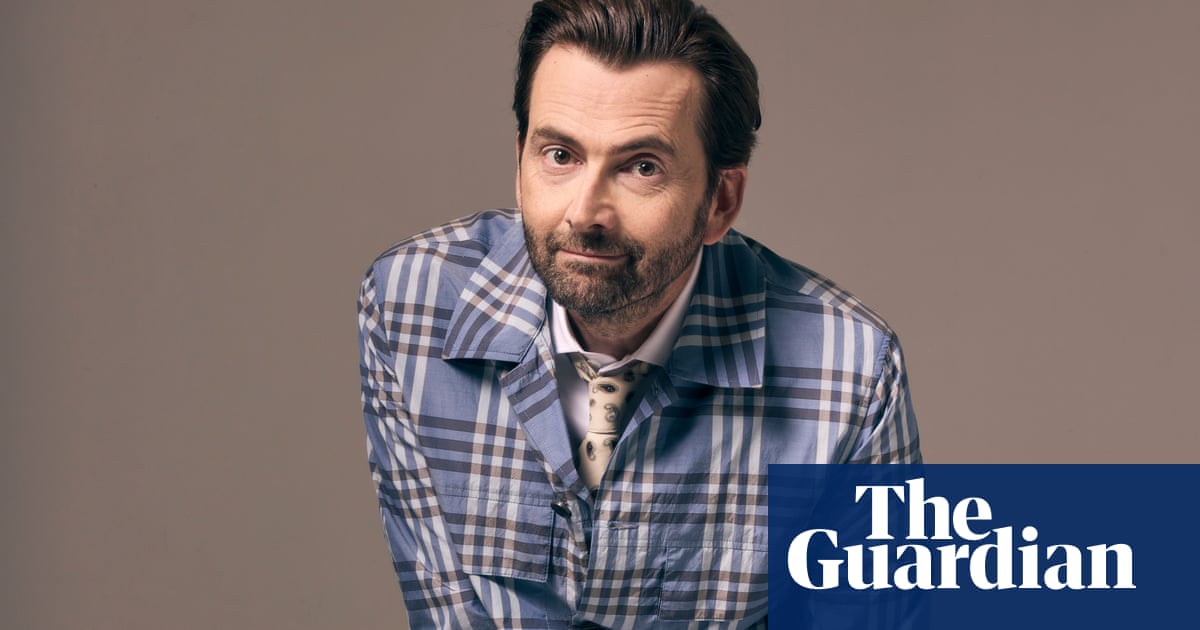It is rare that TV shows are as much of a riot as Disney’sRivals, the screen adaptation of Jilly Cooper’s 1980s bonkbuster about feuding media power players living in the Cotswolds. And David Tennant – as charismatic-but-dastardly TV boss Lord Tony Baddingham – is the show’s rioter-in-chief. In person, the 54-year-old is as charming as his character (if less wicked) – often hooting with laughter to emphasise a point. Rivals isn’t the Scottish actor’s first go at playing the bad guy. While the multi-award-winner is most famous for his stint in Doctor Who, he won an Emmy for his appearance as serial killer Dennis Nilsen in ITV’s Des and starred as a cheeky demon, alongside Michael Sheen, in Good Omens on Prime Video. Series one of Rivals ended with him getting walloped on the head with a TV award, but he promises he’s coming back for Rivals series two.
Were you expecting Rivals to be as massive as it was?I wasn’t, but my wife was. She said that before she’d read the script! Jilly Cooper’s writing has always had a fanbase, but I guess now there’s enough distance from the 1980s that it’s also a period drama.
It looked like a fun shoot. Who was the biggest troublemaker on set?It would be very inelegant of me to be pointing fingers, wouldn’t it? But it was a very social bunch. Sometimes, that was problematic the next day, but everyone turned up and did their job.
Last time we saw Tony, he’d just been hit over the head. Is that the end for him or are you coming back for season two?I mean, it would be quite a weird way to end, wouldn’t it? Maybe you could start season two with the funeral? But we start shooting the day after theBaftas. I don’t know what that means for me on that first morning.
Could it be a hungover start?It might be, yeah!
Did you base TonyBaddingham on anyone?The only example I could think of, who was a television executive with braces and smoke cigars, was Michael Grade. I read his autobiography in preparation. I don’t think it particularly helped. I think he’s probably a more balanced, better human than Tony Barrington is.
The series had some racy scenes. Were there any awkward moments?Anything that involves imitating an intimate experience is not my most comfortable place. Things that are – quite rightly – put in place for safety sometimes make the whole thing a little ridiculous. The modesty pouches!
The 1980s world of Rivals is fuelled by money, power and ruthless media moguls. Howhas that changed today?When Jilly wrote it, it was the world as she experienced it. Now, we can enjoy the awfulness of the way things were, because we can be slightly smug in the fact that it’s not quite as awful as it was then.
You’ve presented thefilm Baftasfor the past two years. At the most recent, you made a joke about Donald Trump being a villain. Were you nervous to do that in a room full of Americans?Should I have been? It’s a funny world – what you’re allowed to say and what you’re not, and what becomes a headline and what doesn’t. You can’t quite predict it. You’re suddenly aware of things you would never have thought twice about, satirical swipes that you might have made without imagining they had consequences beyond a punchline. That feels like it’s being weaponised in all sorts of debates.
At another awards ceremony last year,you called forKemi Badenoch to ‘shut up’on the matter of transgender rights, and it led to amedia frenzy. Shebrought you up again after thesupremecourt ruling about the definition of womanhood. Is it weird to you that thecomment caused such a conversation?It’s very helpful not being on social media, because that’s where, if someone criticises something you’ve said, it can feel like a pile-on and it can feel bigger than it probably is, which probably discourages people from saying things. Because that’s part of the point, isn’t it, that people are terrorised into not holding opinions – the idea that we can be silenced.
You’reexecutive producing and starring inThe Hack, about the phone-hacking scandal. What’s the most shocking thing you learned?Oh God, it’s a minefield to talk about, as you can imagine; lawyers from every side of the debate are poring over anything that is said. But the whole thing was a shocker.
I saw a story recently about bookies betting thatNcuti Gatwawas going to leave Doctor Who and be replaced by you. Is there any truth to that?Ha, nobody’s told me that!
Are you protective of the doctors that have come after you, having seenwhatJodie WhittakerandGatwafaced?These debates – and it’s not even a debate, it’s a small clutch of people shouting very loudly, amplified by certain elements of the press – are not reflective of what most people feel. Things become ludicrously disproportionate, and end up being unnecessarily cruel. That’s what the trans debate seems to have become. Most people don’t give a shit. I genuinely believe most people just want to let people be themselves. All they’re doing is making a tiny portion of society who have a really tough time anyway have an even tougher time.
What’s your guilty pleasure show?I love The Masked Singer. And The Traitors was just glorious.
The BaftaTelevisionAwards with P&O Cruises is on BBC One and BBC iPlayer tomorrow at 7pm.
Catch the full lineup of our Bafta TV special launching across the weekend and starring best actor nomineesDavid Tennant, Lennie James, Monica Dolan, Billie Piper, Richard Gadd, Marisa Abela and Sharon D Clarke
Read more in the series
